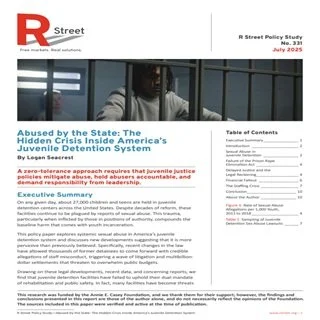By Logan Seacrest
R Street Policy Study No. 331 July 2025 A zero-tolerance approach requires that juvenile justice policies mitigate abuse, hold abusers accountable, and demand responsibility from leadership. Executive Summary On any given day, about 27,000 children and teens are held in juvenile detention centers across the United States. Despite decades of reform, these facilities continue to be plagued by reports of sexual abuse. This trauma, particularly when inflicted by those in positions of authority, compounds the baseline harm that comes with youth incarceration. This policy paper explores systemic sexual abuse in America’s juvenile detention system and discusses new developments suggesting that it is more pervasive than previously believed. Specifically, recent changes in the law have allowed thousands of former detainees to come forward with credible allegations of staff misconduct, triggering a wave of litigation and multi billion dollar settlements that threaten to overwhelm public budgets. Drawing on these legal developments, recent data, and concerning reports, we find that juvenile detention facilities have failed to uphold their dual mandate of rehabilitation and public safety. In fact, many facilities have become threats in and of themselves, perpetuating cycles of abuse and criminality among already vulnerable youth. The persistence of abuse in state-run youth facilities undermines both the rehabilitative mission of juvenile justice and the public’s trust in government. It also creates long-term public safety concerns by perpetuating cycles of trauma, recidivism, and system involvement. To address these failures, we offer an evidence-based policy roadmap to strengthen the Prison Rape Elimination Act, expand reporting mechanisms, raise hiring standards, update infrastructure, and bolster oversight. These recommendations should be combined with a strategic reduction in the footprint of secure detention overall, as the most effective safeguard against institutional abuse is to reduce unnecessary incarceration in the first place.
R Street Policy Study No. 331 Washington, DC: R Street, 2025. 10p.


